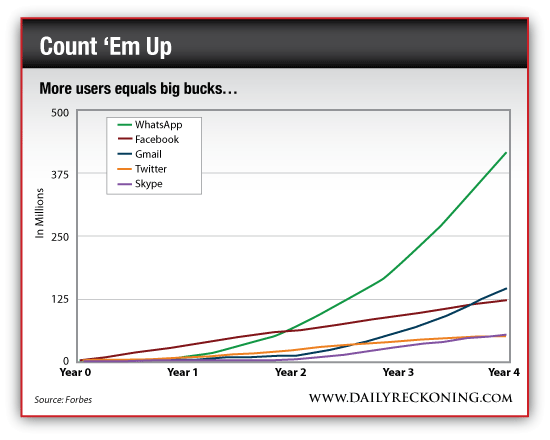In the latest chapter of the social media saga, Facebook (FB) shelled out a staggering $19 billion for an “app” you’ve probably never heard of…
After the deal hit the wire last week, market pundits lost their collective minds. After all, why would Facebook shell out $19 billion for an app that’s got a less than stellar revenue stream and no desire for ad-monetization?
Today, I’m going to try to figure that out.
Now, before you commit me to a mental institution, I need you to open up to the possibility that Facebook’s purchase of WhatsApp might not be the biggest disaster of the Internet Age…
“Pricing a company like WhatsApp involves looking at the user base,” explains Rude researcher Noah Sugarman. “WhatsApp has 450 million of them — 70% of whom are actively engaged every day in the app.”
These users are there for a reason — WhatsApp allows folks to message their friends while avoiding text message charges from their cell phone carrier.
“Those users are thus less engaged with traditional cell phone services that charge customers money every month to do what WhatsApp lets its users do for practically no money at all,” Noah continues. “As a result, traditional cell phone providers are taking it on the chin. Heavyweights like Verizon and Vodafone lost $33 billion in texting revenue to companies like WhatsApp in 2013 alone.”
From that perspective, Facebook starts to look a little more strategic in its move. Telecom providers still earned $120 billion in 2013 from text messaging. But you can expect dramatically slimmer revenues going forward. That’s especially true because people are hopping off traditional cell phone providers and hopping onto WhatsApp at a much faster rate than even the big social network services…

“You see, rather than cutting into the cell phone provider revenue stream, Facebook – through WhatsApp – is looking to eliminate the stream altogether,” Noah explains. “It’s very similar to what Amazon does in its e-commerce space. Facebook is fine with sacrificing some of its profits to make sure its competitors’ wallets feel the bigger pinch.
“We’re now witnessing a massive shift in how people communicate over long-distances – and how much they’ll pay to do it…”
- Bulenox: Get 45% to 91% OFF ... Use Discount Code: UNO
- Risk Our Money Not Yours | Get 50% to 90% OFF ... Use Discount Code: MMBVBKSM
Disclaimer: This page contains affiliate links. If you choose to make a purchase after clicking a link, we may receive a commission at no additional cost to you. Thank you for your support!

Leave a Reply